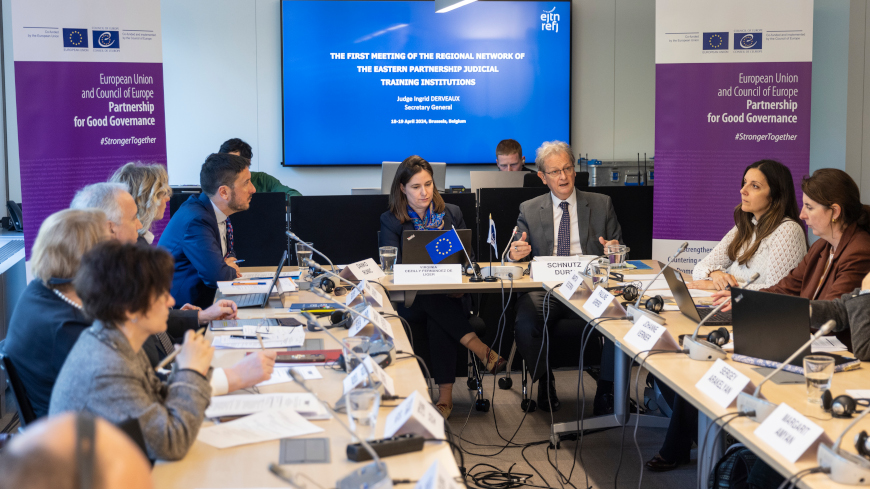Rectors, vice-rectors and heads of international co-operation departments from Eastern Partnership judicial training institutions gathered in Brussels on 18-19 April 2024 for a series of meetings, presentations and workshops aimed at establishing a regional network. The aim of this regional network is to enable knowledge exchange, cross-fertilisation, and particularly advancing work on women’s access to justice and gender mainstreaming across initial and continuous training of future judges and prosecutors.
Over the course of two days, institutions from the Eastern Partnership discussed with representatives of the European Judicial Training Network (EJTN), as well as counterparts from the French National School of Magistrates and the Portuguese Centre for Judicial Studies on benefits and key challenges to networking among training institutions. The workshop was designed to finetune the step-by-step strategy on establishing the network and the methodology for its work.
The meeting was opened by Schnutz Dürr, Head of Programming and Resource Mobilisation Department, Directorate of Programme and Co-ordination of the Council of Europe, Virginia Cezilly Fernandez de Liger, Programme and Policy Officer Good Governance and Security in DG NEAR and Marta Becerra, Head of Co-operation Unit at the Council of Europe Gender Equality Division.
Schnutz Dürr emphasised that “building cross-border networks and a closer unity and international co-operation is an essential task of our Organisation”. He also thanked DG NEAR for the excellent co-operation and for joint efforts to support beneficiary institutions.
Virginia Cezilly Fernandez de Liger stated that the co-operation with Council of Europe has brought several benefits in the prevention of violence against women and domestic violence across the Eastern Partnership, while the launch of the regional network of judicial training institutions is a significant milestone in further ensuring women’s access to justice.
Marta Becerra thanked all partners and stressed that objectives of the future network go beyond enhancing the quality and effectiveness of judicial training and concern advancing gender mainstreaming and women’s access to justice.
All partners are set to meet again in early July in Strasbourg at the margins of the HELP Annual Conference for detailed discussions on setting up the network, including its co-operation and governance framework.
This activity is part of the European Union and the Council of Europe joint programme “Partnership for Good Governance”, co-funded by the European Union and the Council of Europe, and implemented by the Council of Europe, in the framework of the regional project “Women's Access to Justice: implementing Council of Europe’s gender equality and violence against women standards”.





